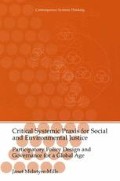Abstract
As I write this chapter the news of a change in community dynamics came about with the new Chief Minister Claire Martin, declaring that she would end mandatory sentencing (23rd August 2001) and the Yeperenye (Butterfly) Centenary of Federation was celebrated in Alice Springs, led by bands such as Yothu Yindi celebrating 60,000 years of Aboriginality. It highlighted survival of the spirit in Alice Springs (known as Mparntwe or ‘caterpillar dreaming’) through colonisation, separation through the stolen generation, the nuclear testing at Maralinga and the early land rights appeals to current day appeals for a treaty. The voices retain a strident sense that land is an issue and that reparation remains an unaddressed concern. It is in this context that participation needs to be addressed in planning for the future if a nation within a nation is to become a nation of respected citizens who participate in practical solutions for development, rather than a nation based on separation and reparation. A new potential for generating a shared sense of community is possible and the future is ripe for implementing participatory designs that could make a real difference for the future. Banathy (1996) stresses this as the distinction between ‘generative’ and ‘strategic dialogue’. The one must precede the other for trust to be developed (Laszlow 2001).
In order to be able to close the gap between technological and socio-cultural intelligence, a major shift toward attaining more understanding and human wisdom is required. Weshould create learning that enhances critical thinking, the understanding of the self, the systems and the environments in which we live, and the situations we experience. We can nurture wisdom by creating learning resources and arrangements by which to relate knowledge acquired and understanding gained to pragmatic, moral, ethical, and affective issues. We can then apply wisdom in making judgements, managing problem situations, making decisions, and living our lives enriched by our growing wisdom.
Banathy 1991: 77
Access this chapter
Tax calculation will be finalised at checkout
Purchases are for personal use only
Preview
Unable to display preview. Download preview PDF.
Author information
Authors and Affiliations
Rights and permissions
Copyright information
© 2003 Springer Science+Business Media New York
About this chapter
Cite this chapter
McIntyre-Mills, J. (2003). Conclusion: Addressing Complex Reality. In: Critical Systemic Praxis for Social and Environmental Justice. Contemporary Systems Thinking. Springer, Boston, MA. https://doi.org/10.1007/978-1-4419-8921-5_9
Download citation
DOI: https://doi.org/10.1007/978-1-4419-8921-5_9
Publisher Name: Springer, Boston, MA
Print ISBN: 978-1-4613-4721-7
Online ISBN: 978-1-4419-8921-5
eBook Packages: Springer Book Archive

